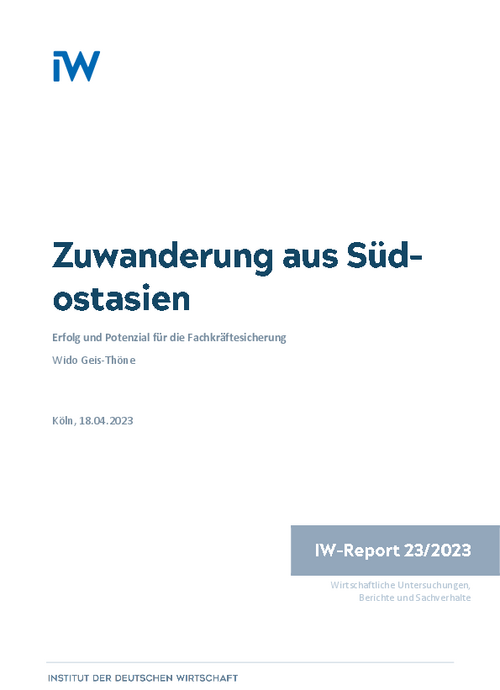In the coming years, Germany will be increasingly dependent on skilled workers from abroad in order to avoid that gaps in the labour market caused by the retirement of the baby boomers will jeopardise growth and prosperity.

Immigration from Southeast Asia: Success and potential for securing skilled workers

In the coming years, Germany will be increasingly dependent on skilled workers from abroad in order to avoid that gaps in the labour market caused by the retirement of the baby boomers will jeopardise growth and prosperity.
At the same time, the migration potential in the other EU countries is likely to decline sharply as the demographic change is also progressing here. Thus, German migration policy must focus on the non-European area. One focus should be on South-East Asia. Arguments in favour of this region are that it accounts for 8.5 per cent of the world's population and the basic conditions are comparatively favourable for the targeted recruitment of skilled workers. Social and economic development is already so advanced that the United Nations Human Development Index (HDI) attributes six of the eleven countries a high or very high level of development and five a medium level of development and demographic development is at a stage where the proportion of the population in working age between 15 and 64 is particularly high at 67.6 percent. However, the comparatively large geographical distance and the already existing strong migration links between Southeast Asia and the Anglo-Saxon world can have an inhibitive effect.
In recent years, there have already been major successes in immigration from Indonesia, the Philippines and Vietnam, where, among other things, the online portal "Make it in Germany" has specifically promoted skilled labour immigration to Germany. The number of Indonesians in employment subject to social insurance contributions rose by 237.7 per cent from 3,100 to 10,400 between June 2012 and June 2022 and, with a share of 30.1 per cent in June 2022, many of them were employed in expert and specialist occupations, which typically require a university degree or advanced vocational degree to master craftsman and the like. The number of Filipino workers was even slightly higher, at 20,500 in June 2022, and the share of workers in the total Filipino population aged 15-64 was also very high, at 65.1 per cent in December 2021. Moreover, at 48.2 per cent, almost half of the Filipino workforce was employed in the health and social work sector, which is particularly affected by labour shortages. However, they rarely work as experts or specialists and, unlike Indonesia, there has not yet been a strong influx from the Philippines to German universities. The Vietnamese are by far the largest group of employees subject to social insurance contributions from Southeast Asia in Germany, accounting for 51,000 of 107,500 in June 2022. Their community in Germany has been relatively large for a longer time, which is mainly due to the targeted recruitment of Vietnamese workers by the GDR. In recent years, however, the Vietnamese population in Germany has again grown strongly and their situation on the labour market has improved considerably. The situation is different for Thais, who are currently the second largest Southeast Asian population group in Germany and have the peculiarity that almost nine-tenths of them are women. After strong immigration in the 1990s and 2000s, their numbers hardly increased anymore in the 2010s.

Immigration from Southeast Asia: Success and potential for securing skilled workers

More on the topic

Securing skilled workers through immigration to universities
Against the backdrop of demographic change, Germany is increasingly dependent on skilled labour from abroad to secure growth and prosperity.
IW
Record immigration not only due to flight from Ukraine
In 2022, more people immigrated to Germany than ever before in the history of the Federal Republic. Around 1.46 million more people moved here than left the country, which is more than a quarter more than the previous record of 1.14 million from 2015.
IW